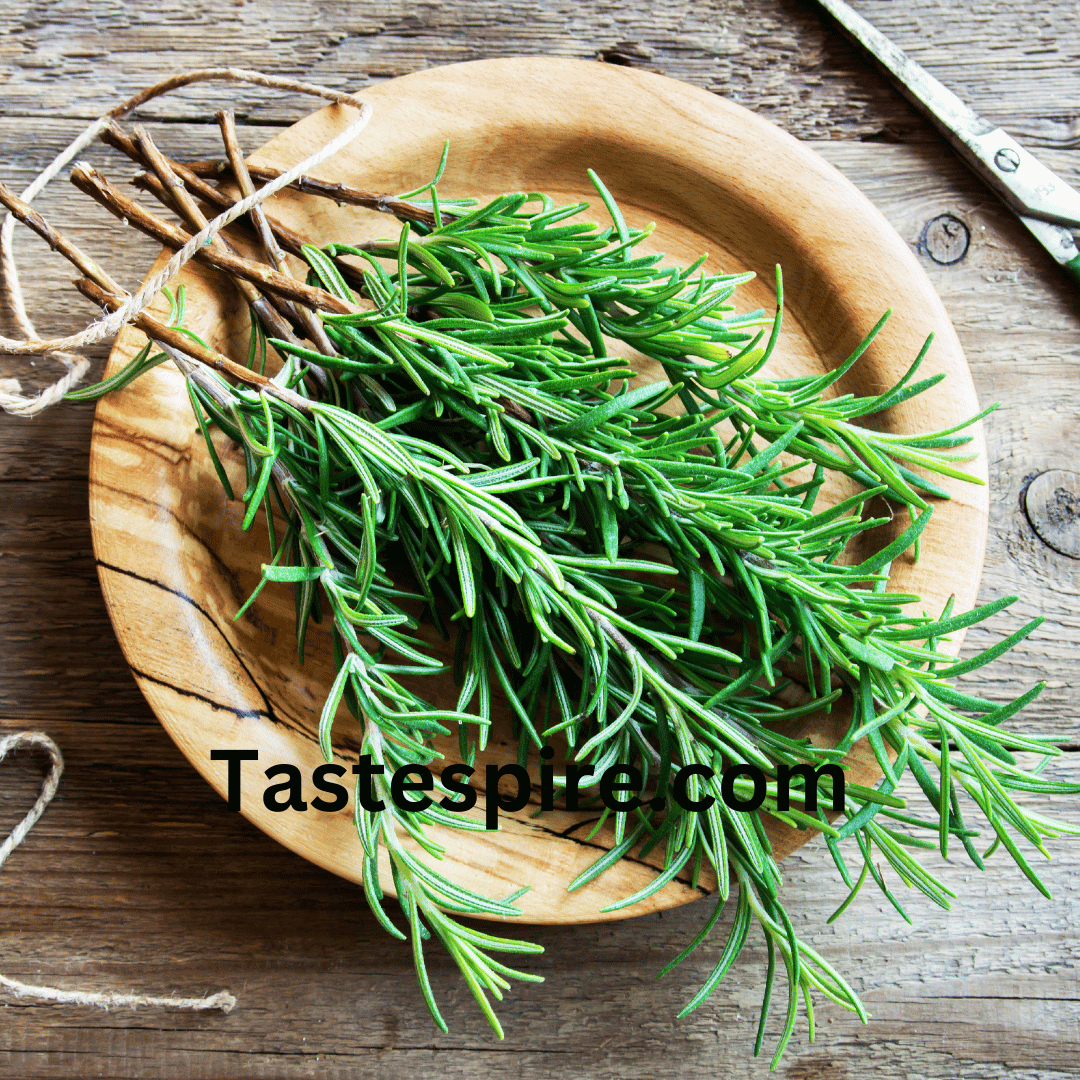In this blog post we’re delving into the culinary world to discover the “Best Substitutes for Rosemary.” Imagine this you’re all set to cook up a storm in your kitchen and then you realize you’ve run out of rosemary. Don’t worry we’ve got you covered Having versatile rosemary substitutes in your kitchen is like having a trusty backup plan for your favorite recipes.
Here we’ll explore a range of fantastic alternatives to rosemary each with its own unique flavor profile and ideal culinary applications. So if you’ve ever wondered what to use when you’re out of rosemary you’re in the right place! Let’s dive into the world of these flavorful alternatives and discover when to use them to elevate your dishes to a whole new level.
Table of Contents
Why Substitute Rosemary?
Sometimes even the best-laid kitchen plans can hit a snag. You might wonder why anyone would need to substitute rosemary that beloved herb with its fragrant needle-like leaves. Well life in the kitchen can be unpredictable and there are several scenarios where you might find yourself in need of a rosemary alternative.
- 1. Running Low on Rosemary: The most obvious reason is running out of rosemary. We’ve all been there eager to whip up a culinary masterpiece only to find the rosemary jar empty.
- 2. Personal Preferences: Rosemary has a distinct flavor a delightful blend of herbal, piney and slightly bitter notes. But not everyone is a fan of its unique taste. If you or someone you’re cooking for isn’t particularly fond of rosemary having alternatives is a lifesaver.
- 3. Dish Compatibility: While rosemary is a kitchen superstar there are dishes where its flavor might not be the perfect fit. Exploring substitutes ensures your culinary creations are harmonious and flavorful.
The Flavor Profile of Rosemary
Before we delve into the substitutes let’s understand what makes rosemary so special. Rosemary brings a delightful herbal, piney and slightly bitter flavor to the table. Its aromatic charm is reminiscent of the great outdoors with hints of both earthy and citrusy notes.
This unique flavor profile makes rosemary a versatile herb that plays well with a wide range of dishes. From hearty soups and rich stews to succulent meats, poultry, seafood, vegetables, freshly baked bread and even cocktails rosemary can do it all.
So while rosemary is undoubtedly a kitchen MVP let’s explore some equally impressive substitutes to ensure your recipes shine no matter the circumstances.
15 Best Substitutes For Rosemary
Here’s a list of the 15 best substitutes for rosemary along with a brief description of each substitute’s flavor profile and characteristics:
- Thyme
- Sage
- Tarragon
- Marjoram
- Savory
- Basil
- Caraway Seed
- Oregano
- Italian Seasoning
- Parsley
- Peppermint
- Dill
- Chives
- Cilantro
- Lemon Thyme
Thyme
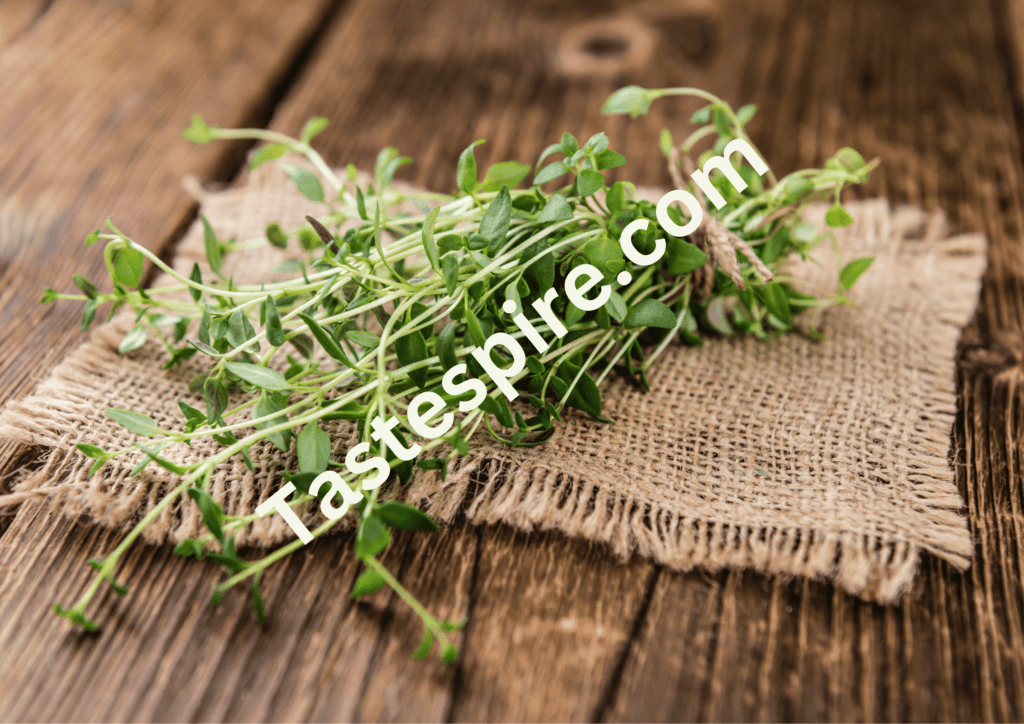
Thyme is a versatile herb known for its mild earthy flavor profile which includes subtle floral and minty notes. When you’re seeking a gentle herbaceous touch in your dishes thyme makes an excellent substitute for rosemary. Its delicate flavor won’t overpower your recipes allowing other ingredients to shine through.
Thyme pairs exceptionally well with a wide range of dishes including roasted meats, poultry, vegetables and even in soups and stews. Its versatility in both fresh and dried forms makes it a kitchen staple for home cooks and chefs alike.
So whether you’re looking to season a hearty beef stew or enhance the flavors of a roasted chicken thyme is a reliable choice that adds depth and a touch of herbal elegance to your culinary creations.
Sage

Sage is a herb known for its unique flavor profile which includes pine-like notes with hints of eucalyptus, lemon and mint. This distinctive combination of flavors makes sage a versatile substitute for rosemary particularly when you’re looking to season poultry, stuffing, sausages and various egg and meat dishes.
Sage’s strong and aromatic nature allows it to stand out in recipes adding a robust and earthy essence that complements a wide range of dishes. It pairs exceptionally well with chicken and pork enhancing the taste of roast chicken or giving a delightful twist to sausage recipes.
When using sage as a rosemary replacement it’s essential to exercise caution due to its potent flavor. Start by adding a small amount of sage typically about half the amount of rosemary required in your recipe and then adjust to taste. This way you can enjoy the unique and savory qualities of sage without overpowering your dishes.
Tarragon
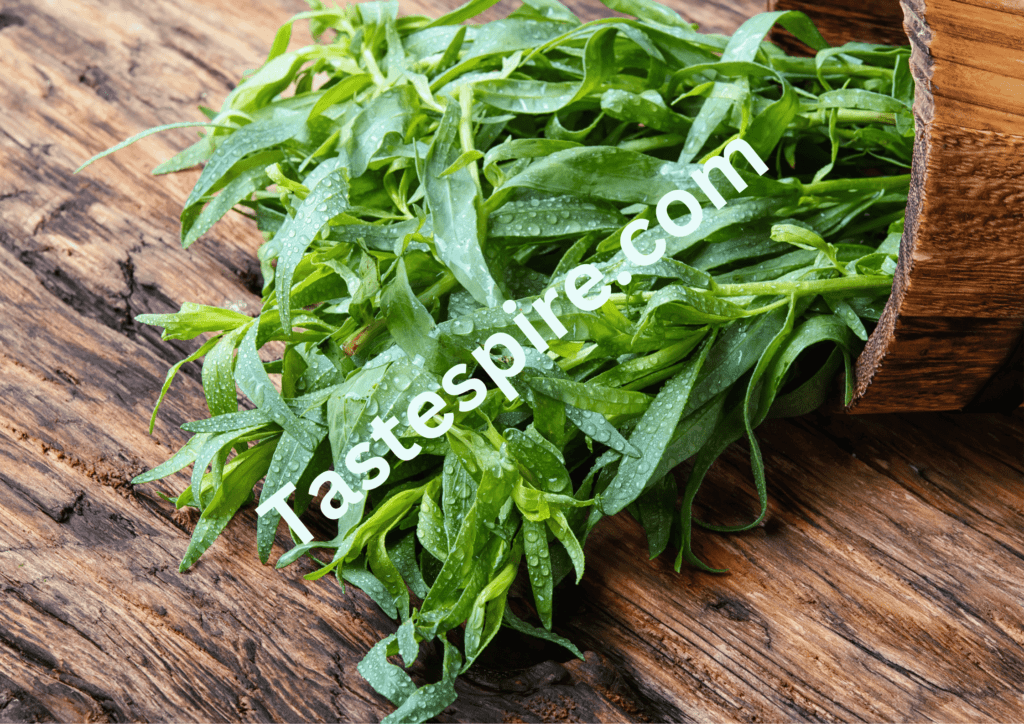
Tarragon is a herb that stands out with its robust flavor profile characterized by strong notes of anise and licorice. This distinctive taste makes tarragon an excellent choice for various culinary applications especially in dishes that benefit from a unique twist.
Tarragon is particularly well-suited for seafood where it can elevate the natural flavors of fish and shellfish. It also finds a home in soups especially those with a delicate broth where tarragon’s aromatic qualities can shine. Additionally tarragon is a staple in French cuisine often used in chicken dishes, eggs and cheese-based recipes.
One of tarragon’s key attributes is its ability to add a fresh and slightly sweet dimension to your dishes. It can brighten up the flavors creating a harmonious blend of sweet and savory notes. When using tarragon as a substitute for rosemary it’s advisable to start with a moderate amount and adjust to your taste preferences. This way you can make the most of tarragon’s unique flavor without overwhelming your culinary creations.
Marjoram

Marjoram with its appearance somewhat resembling rosemary brings a distinct flavor to the table. Its taste profile includes citrusy and piney notes which set it apart as an excellent substitute for rosemary especially in meat and mushroom-based dishes.
The citrusy undertones of marjoram can add a refreshing twist to your culinary creations. When used in meat dishes it complements the savory notes with a hint of bright citrus creating a well-balanced flavor profile. Moreover marjoram pairs exceptionally well with mushrooms enhancing the earthy richness of these fungi with its piney essence.
Marjoram is a versatile herb used to season various dishes, including soups, stews, sauces, herbal teas and salad dressings. When substituting marjoram for rosemary you can generally use a 1:1 ratio making it easy to incorporate into your recipes. As with any herb you can adjust the quantity to suit your palate allowing you to explore and savor the delightful flavors that marjoram brings to your cooking.
Savory

Savory comes in two main varieties winter and summer each offering its unique flavor profile. Both types of savory impart a thyme-like essence with subtle hints of mint and marjoram. This herb is particularly well-suited for seasoning beans and meats finding its place predominantly in European cuisine.
- Winter Savory offers a flavor profile that’s slightly more earthy with notes reminiscent of pine and sage. Its versatile nature makes it a key ingredient in dishes like beans, soups and meat-based recipes. It’s also a primary component of the classic herb blend known as Herbes de Provence.
- Summer Savory on the other hand exhibits a sweeter and spicier taste compared to its winter counterpart. Its flavor includes hints of thyme, mint, and marjoram which combine to create a unique and lively taste. Summer savory is a delightful addition to dishes that benefit from a hint of warmth and zest. Moreover it can withstand extended cooking times making it an excellent choice for simmering soups, stews and sauces.
Whether you opt for winter or summer savory as a rosemary substitute depends on your specific culinary needs. The choice allows you to explore and experiment with the subtle flavor variations offered by these two savory varieties while adding a touch of herbal sophistication to your dishes.
Basil
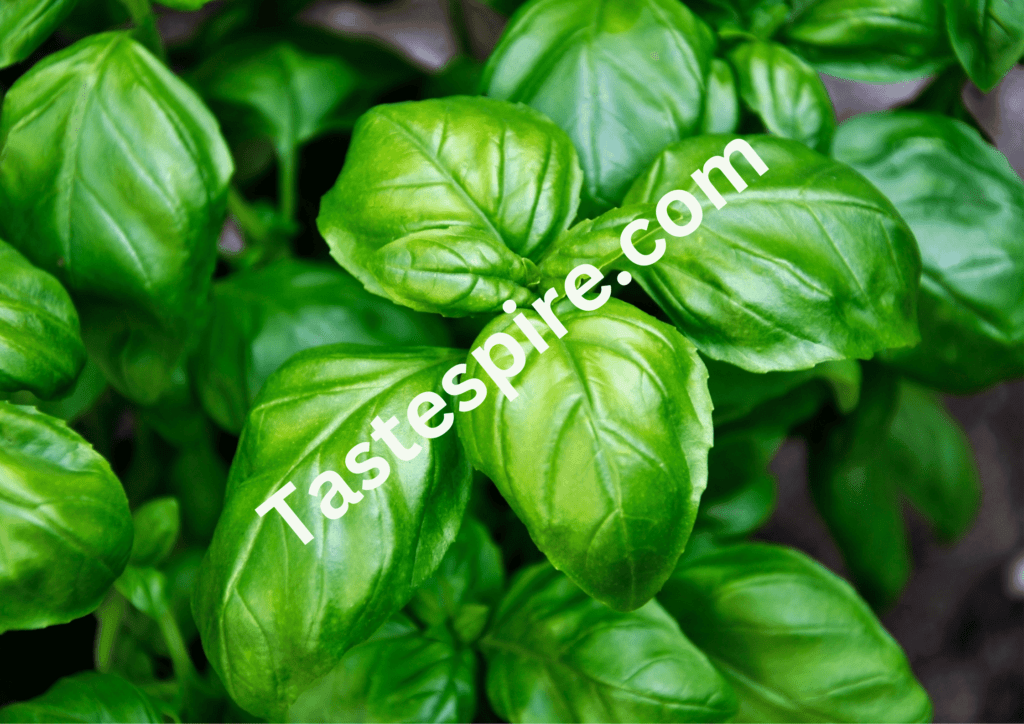
Basil originating from the same mint family of plants as rosemary hails from India. This herb is renowned for its sweet warm flavor with subtle peppery undertones. Basil is an essential ingredient in Italian cuisine where it features prominently in various dishes adding a touch of freshness to your palate.
There are several varieties of basil including Thai, Italian, holy, lemon, and lettuce-leaf basil. Each providing a distinctive spin to your culinary masterpieces. Whether you’re making classic Italian pasta dishes or indulging in Thai spring rolls basil leaves often accompany your meal enhancing its savory and aromatic elements.
When substituting basil for rosemary use it in equal parts to maintain the balance of flavors in your recipe. However it’s essential to note that basil’s delicate nature makes it best suited for adding towards the end of your cooking process. This way its vibrant and refreshing notes remain intact elevating the overall taste experience of your dishes.
Basil’s ability to infuse dishes with its sweet warmth makes it an excellent choice when you’re seeking to replace rosemary. Whether you’re preparing Mediterranean-inspired fare, Italian classics or looking to impart a touch of elegance to your cuisine basil is a versatile and delightful alternative to consider.
Caraway Seed

Abundantly found in North Africa, Asia, and Europe caraway seeds are small but pack a robust and distinctive flavor profile. Also known by names such as Persian cumin and meridian fennel these seeds belong to the carrot family and introduce intriguing elements to your dishes.
When you bite into caraway seeds you’ll encounter an earthy taste coupled with hints of zesty lemon and a subtle peppery kick. What sets caraway seeds apart is their slight but delightful licorice undertone which adds a unique layer of complexity to your culinary creations.
Caraway seeds are widely celebrated in British and European cuisine where they find a special place in the hearts of cooks. These tiny flavor powerhouses can make a remarkable difference particularly when paired with pork and sausage dishes. Their ability to enhance the savory and hearty aspects of these meals makes them an excellent choice when you need to substitute rosemary.
However it’s crucial to exercise a bit of restraint when using caraway seeds as their flavor can be quite potent. Start with a modest amount and gradually adjust to your taste preferences. This ensures that you achieve the ideal balance of flavors in your dishes infusing them with the intriguing and unforgettable essence of caraway seeds.
Whether you’re crafting traditional European dishes experimenting with unique flavor profiles or seeking to elevate your sausage and pork creations caraway seeds are a versatile and compelling substitute for rosemary. Their earthy, lemony, peppery and slightly licorice notes will take your culinary adventures to new heights.
Oregano
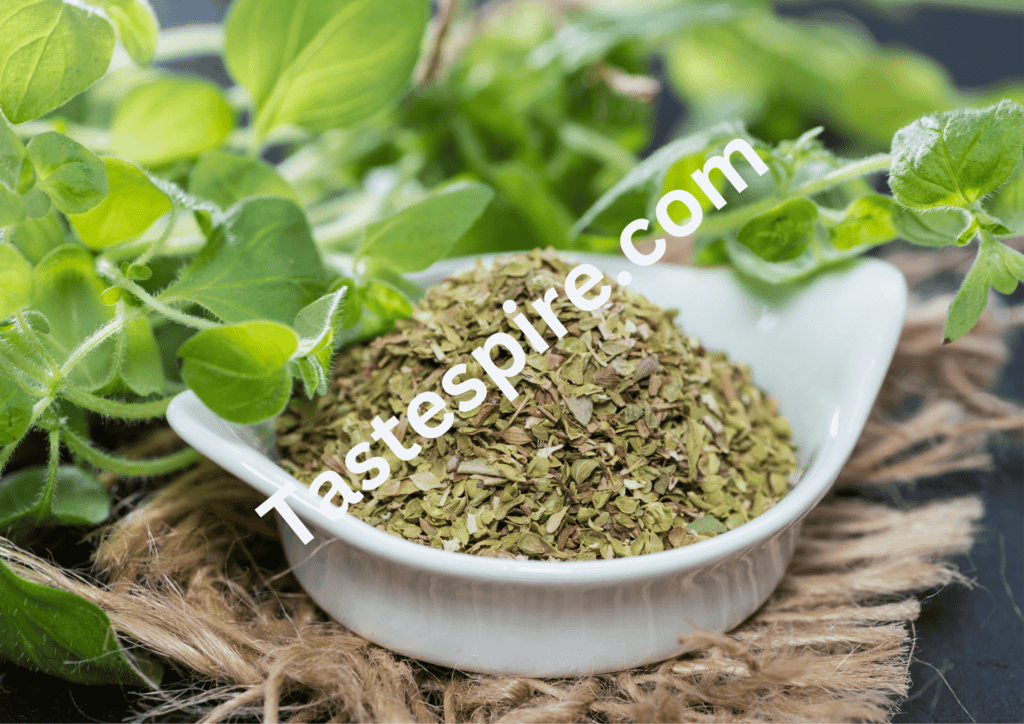
Hailing from the Mediterranean area but now renowned worldwide oregano is a herb that packs a punch. Its flavor profile is robust with a hint of bitterness that adds depth and character to dishes. Oregano is a staple in many kitchens especially those that adore Italian cuisine.
When you think of oregano envision a warm and earthy taste with just a touch of bitterness. This distinctive profile is what makes it an ideal companion for Italian spices ensuring it’s a must-have in dishes like grilled vegetables, meats and fish. In particular oregano shines in the vibrant and spicy southern Italian fare where its bold flavors enhance the overall culinary experience.
Dried oregano in particular has a more potent flavor compared to its fresh counterpart making it a versatile choice for seasoning. Whether you’re crafting a hearty tomato sauce marinating meats for grilling or experimenting with roasted vegetables oregano brings its unique charm to the table.
In dishes that embrace the complexity of Italian seasonings, oregano becomes an indispensable component. Its warm, earthy and slightly bitter notes blend seamlessly with other herbs and spices adding layers of flavor that elevate your cooking to new heights. So when you find yourself needing a rosemary substitute look no further than oregano to infuse your dishes with Mediterranean flair and a hint of aromatic sophistication.
Italian Seasoning

When you desire a hassle-free substitute that encapsulates the essence of Italian herbs Italian seasoning is your culinary savior. This blend is a symphony of flavors artfully combining herbs like thyme, basil, marjoram, oregano and even a touch of rosemary itself.
Imagine a versatile seasoning that effortlessly infuses your dishes with a harmonious blend of earthy, savory and sweet notes. That’s precisely what Italian seasoning brings to your kitchen. It’s the perfect shortcut to Italian-inspired cuisine and it works wonders in a wide array of dishes.
The beauty of Italian seasoning lies in its convenience and ability to deliver a balanced flavor profile without the need for multiple individual herbs. When you reach for Italian seasoning you’re embracing the rich, aromatic heritage of Italy’s culinary traditions.
This versatile blend elevates everything from pasta sauces to roasted meats adding a delightful complexity that enhances the overall taste. Whether you’re creating a homemade pizza simmering a comforting pot of minestrone soup or preparing a savory pasta dish Italian seasoning effortlessly captures the essence of Italy bringing a touch of the Mediterranean to your table.
With Italian seasoning in your pantry you have the power to transport your taste buds to the sun-drenched landscapes of Italy where the art of seasoning is as celebrated as the art of living. So when you’re seeking a substitute for rosemary that encapsulates the heart of Italian cooking look no further than this aromatic blend ready to infuse your dishes with the flavors of the Mediterranean.
Parsley
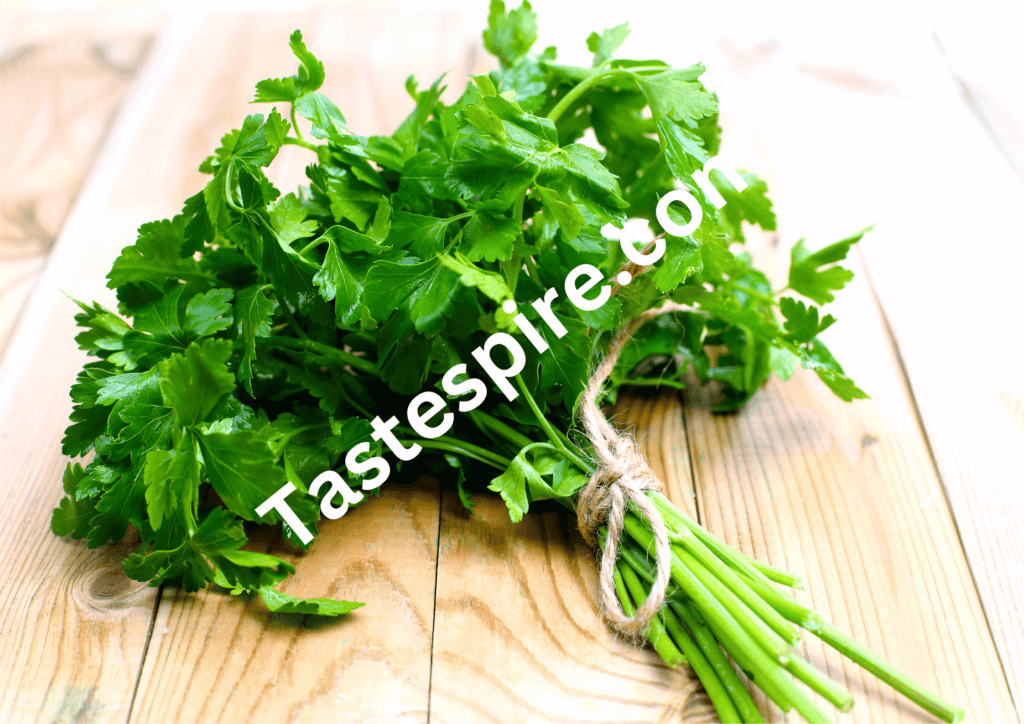
In the world of herbs parsley stands as a beacon of freshness offering a vibrant and slightly peppery taste. While it may not replicate the distinctive piney notes of rosemary it brings its unique charm to your dishes. Think of it as a versatile companion that can elevate a wide range of culinary creations.
Parsley’s appeal lies in its ability to add a burst of freshness and a hint of mild spice to your recipes. It may not replace rosemary’s specific flavor profile but it can certainly enhance your culinary endeavors. Whether you’re preparing a salad garnishing a hearty stew or creating a zesty sauce parsley has a place at the table.
One of the great virtues of parsley is its adaptability. It seamlessly integrates into various cuisines and styles of cooking. Its bright clean flavor can brighten up Mediterranean dishes provide balance in Asian stir-fries and even add a touch of elegance to classic French cuisine.
Parsley’s versatility extends to both its use as a garnish and as an ingredient. Sprinkle fresh parsley over a finished dish for a pop of color and a refreshing contrast. Alternatively incorporate chopped parsley into your recipes to infuse them with a subtle layer of flavor.
So while parsley may not mimic rosemary’s distinct taste it’s a valuable herb to have on hand. Its ability to enhance the overall flavor of your dishes and contribute a touch of freshness makes it a fantastic choice when you need a substitute for rosemary that complements a wide range of culinary creations.
Peppermint

When seeking a rosemary substitute consider the invigorating and minty allure of peppermint. While it doesn’t quite match rosemary’s profile it offers a refreshing twist that can harmonize beautifully with certain dishes.
Peppermint’s claim to fame lies in its cool minty taste with a subtle touch of sweetness. It’s a breath of fresh air in the culinary world providing a unique flavor that can elevate your dishes. Although it doesn’t mirror rosemary’s earthy and piney notes it brings its own distinct character to the table.
One of the areas where peppermint shines is in lamb dishes. It pairs exceptionally well with other herbs like thyme and bay leaf creating a tantalizing blend of flavors that perfectly complements the richness of lamb. Whether you’re roasting a leg of lamb preparing lamb chops or crafting a savory lamb stew peppermint can be your secret ingredient for a memorable meal.
Peppermint’s versatility extends beyond the realm of savory dishes. It’s a natural fit for desserts and beverages where its minty freshness can invigorate everything from chocolate treats to soothing teas. If you’re exploring the world of culinary experimentation don’t hesitate to incorporate a touch of peppermint to see where its refreshing notes can take you.
In conclusion while peppermint doesn’t mimic rosemary’s exact profile it offers a distinctive and revitalizing flavor that can work wonders in certain culinary contexts. Consider it as a valuable addition to your kitchen particularly when you’re looking to add a minty twist to your dishes or create memorable lamb-based masterpieces.
Dill

If you’re diving into the world of seafood dishes and need a suitable replacement for rosemary look no further than dill. With its distinct blend of grassy and anise-like notes dill brings a unique flavor profile to the table that can elevate your fish-based recipes.
Dill’s claim to culinary fame lies in its refreshing taste reminiscent of both grassy herbs and subtle hints of anise. This combination makes it an ideal companion for seafood where its bright and slightly licorice-like undertones can harmonize beautifully with various fish varieties.
When using dill as a rosemary substitute consider dishes like baked salmon, grilled trout or shrimp scampi. Its vibrant flavor can infuse your seafood creations with a fresh and aromatic twist creating a delightful sensory experience for your taste buds. Dill also pairs well with lemon, garlic and butter enhancing the overall appeal of your seafood preparations.
Beyond seafood dill’s versatility extends to salads, dressings and even pickles. Its unique taste can add a refreshing and slightly tangy element to your culinary creations making it a valuable addition to your kitchen repertoire.
In summary while dill doesn’t mimic rosemary’s profile its distinctive blend of grassy and anise-like flavors makes it an excellent substitute especially in seafood dishes. Whether you’re a seafood enthusiast or simply looking to diversify your flavor palette dill is a versatile herb that deserves a place in your culinary toolkit.
Chives

When seeking a gentle and onion-like touch to replace rosemary turn to chives. These slender green herbs are known for their mild, yet delightful, flavor profile making them an excellent choice for specific culinary scenarios.
Chives bring a mild onion-like taste to your dishes adding a subtle layer of flavor without overwhelming other ingredients. While this flavor profile differs from rosemary’s herbal and piney notes chives have their own unique charm that shines in particular culinary applications.
One of the key advantages of chives is their ability to provide a delicate onion essence without the pungency of traditional onions or garlic. This makes them a suitable replacement for rosemary in dishes where you want to introduce a mild allium-based flavor without the robustness of garlic or shallots.
Consider incorporating chives into recipes like creamy soups, scrambled eggs, potato dishes, and various creamy sauces. They work exceptionally well in salads garnishing baked potatoes or sprinkled over cream cheese on bagels for a burst of fresh mild onion flavor.
While chives may not replicate rosemary’s boldness their subtle onion-like notes offer a distinct and pleasant alternative. If your culinary adventure calls for a milder flavor enhancement chives can step in gracefully and elevate your dishes with their understated charm.
In conclusion chives present a mild and onion-like replacement for rosemary perfect for dishes where a delicate allium-based flavor is desired. Whether you’re adding a finishing touch to a creamy soup or looking to enhance the appeal of your breakfast eggs chives bring their unique character to the culinary scene.
Cilantro
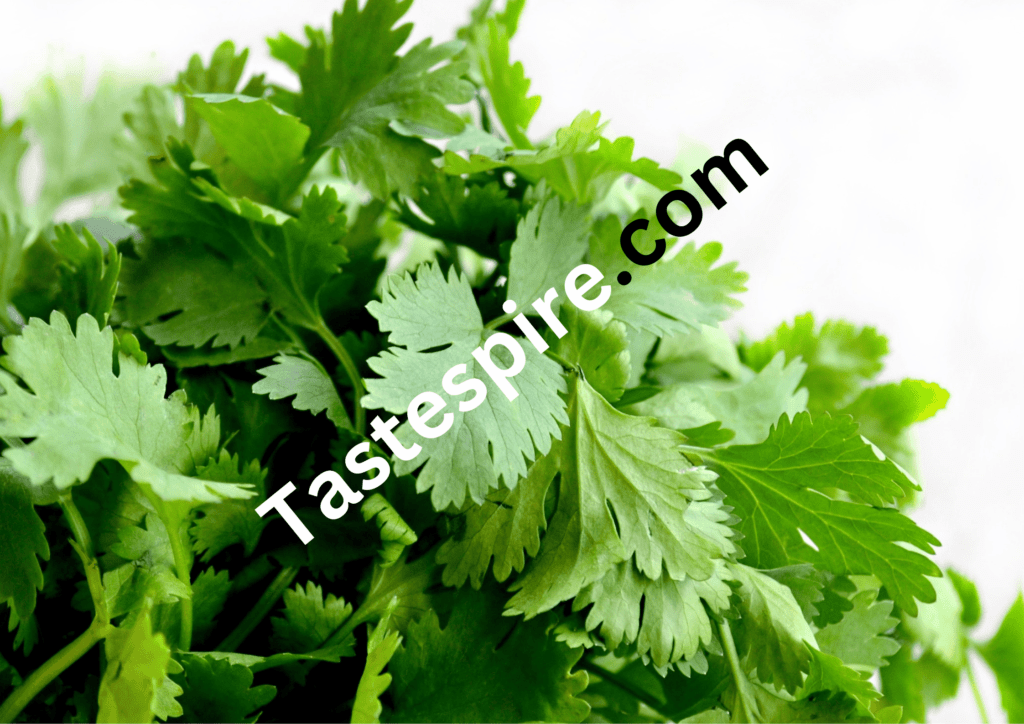
For those seeking a fresh and citrusy twist in their dishes cilantro can be an intriguing alternative. While not a direct substitute for rosemary due to its distinct flavor profile cilantro has the potential to enhance the taste of certain dishes in a unique way.
Cilantro is renowned for its vibrant herbaceous flavor with citrus undertones. It introduces a zesty and refreshing element to your culinary creations making it a compelling choice for recipes where rosemary’s piney and herbal notes might not fit.
While cilantro and rosemary have different flavor profiles cilantro can complement specific dishes exceptionally well. Its bright and citrusy notes can uplift Mexican, Thai, Indian and Mediterranean cuisines adding a burst of freshness to your recipes.
Consider using cilantro as a substitute for rosemary in dishes like salsas, guacamole, marinades and dressings where its lively flavor can contribute to a delightful flavor balance. It’s also a fantastic choice for garnishing tacos, curries, grilled seafood and various vegetable-based dishes.
Cilantro’s ability to infuse dishes with a refreshing and citrusy kick makes it a valuable addition to your kitchen especially if you enjoy experimenting with diverse culinary traditions. While it may not mimic rosemary’s profile cilantro’s unique character can bring new dimensions of flavor to your cooking.
In summary cilantro offers a fresh and citrusy flavor that can provide a zesty twist to your recipes although it doesn’t directly replace rosemary. Its ability to enhance specific dishes especially those with Mexican, Thai, Indian or Mediterranean influences makes it a valuable ingredient for creative cooking.
Lemon Thyme

If you’re looking to infuse a lemony essence into your dishes while substituting rosemary lemon thyme is a delightful choice. It combines the earthy herbaceous notes of traditional thyme with a refreshing citrusy aroma creating a unique flavor profile.
Lemon thyme offers a harmonious blend of flavors making it a versatile herb for various culinary applications. Its earthy undertones provide a solid herbal base while the hint of citrus adds a bright and invigorating twist to your recipes.
When considering lemon thyme as a rosemary alternative think about dishes where a touch of lemon complements the flavors. This herb is particularly well-suited for recipes involving poultry, seafood, vegetables and salads where its lemon-infused aroma can enhance the overall taste experience.
You can use lemon thyme in both fresh and dried forms depending on your preference and availability. Fresh lemon thyme leaves can be chopped and sprinkled over roasted chicken or grilled fish to impart a burst of citrusy fragrance. Dried lemon thyme can be used as a convenient seasoning in marinades dressings, and dry rubs.
When substituting lemon thyme for rosemary consider the dish’s overall flavor profile and whether the addition of a citrusy note would be complementary. Lemon thyme’s versatility makes it an excellent choice for those seeking a fresh twist on traditional recipes.
In summary lemon thyme offers the earthy essence of thyme combined with a citrusy aroma making it an ideal rosemary substitute when you want to introduce a lemony element to your dishes. Its versatility makes it suitable for a wide range of recipes from poultry and seafood to salads and vegetables.
Frequently Asked Questions
How much fresh rosemary is equal to dried?
Typically you can use 1 teaspoon of dried rosemary to replace 1 tablespoon of fresh rosemary. Dried rosemary is more potent so adjust accordingly to maintain the desired flavor.
Can I substitute dry rosemary for fresh?
Yes you can substitute dried rosemary for fresh in most recipes. Remember that dried rosemary is stronger so use it in a 1:3 ratio. For example if your recipe calls for 1 tablespoon of fresh rosemary use 1 teaspoon of dried rosemary.
Which herb tastes like rosemary?
Thyme is one of the herbs that tastes similar to rosemary. It offers an earthy herbal flavor with subtle floral and minty notes making it an excellent substitute.
Can I substitute basil for rosemary?
While basil has a different flavor profile it can be used as a substitute for rosemary in certain dishes. Basil provides a sweet and warm flavor adding freshness to your recipes.
What can I substitute for 1 teaspoon of fresh rosemary?
For 1 teaspoon of fresh rosemary you can use approximately 1/4 teaspoon of dried rosemary. Adjust the amount to suit your taste as dried rosemary is more potent.
Can I substitute rosemary for parsley?
Rosemary and parsley have distinct flavors but in some cases you can use parsley as a substitute for rosemary if you want a milder herbaceous flavor. However keep in mind that parsley won’t provide the same piney notes as rosemary.
Conclusion
In conclusion having versatile substitutes for rosemary in your kitchen is a culinary lifesaver. Whether you run out of rosemary or want to explore new flavors these alternatives can elevate your dishes.
We delved into the flavor profile of rosemary highlighting its herbal, piney, and slightly bitter notes. This versatile herb finds its way into various recipes from soups and stews to meats, poultry, and even cocktails.
Our list of the 15 best rosemary substitutes offers a diverse range of flavors from thyme’s gentle herbaceous touch to caraway seeds’ earthy warmth. Each substitute has unique characteristics making it suitable for specific dishes.
While experimenting with these substitutes remember that the ratio of fresh to dried herbs may vary. Don’t hesitate to adjust the quantities to suit your taste. Whether it’s the zesty freshness of basil or the robust bitterness of oregano these substitutes can unlock new dimensions in your cooking.
So the next time you find yourself without rosemary embrace the opportunity to explore new flavors and expand your culinary repertoire. Having these substitutes on hand can turn any cooking dilemma into a flavorful adventure.
Read More:
